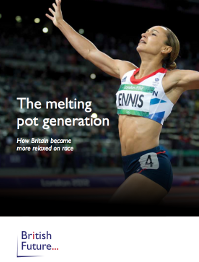Jessica Ennis, Mo Farah and Identity Language in the British Press: A Case Study in Monitoring and Analysing Print MediaPosted in Communications/Media Studies, Media Archive, Reports, United Kingdom on 2012-12-18 19:58Z by Steven |
Migration Observatory
University of Oxford
2012-12-11
10 pages
William Allen, Senior Researcher
Scott Blinder, Senior Researcher
Introduction and context
Since July 2012, the Migration Observatory has been building the framework for a Media Monitoring Project. Its aim is to improve understanding of the coverage of migration and related issues in the British press. We are gathering a comprehensive set of articles from Britain’s national newspapers beginning in 2005 and to be continuously updated to the present on a weekly basis. These articles will include all mentions of migrants, refugees, and asylum seekers in British newspapers. From this large database (or ‘corpus’ of texts), we will get a sense not only of how much attention the press devotes to migration, but also the nature of coverage. This will include the general tone of coverage and the specific ways in which migrants are portrayed. We are interested in knowing, for example, if press is currently contributing to the widespread public perception of immigrants as asylum seekers (see the Migration Observatory report – Thinking behind the Numbers). This image may stem from high levels of asylum applications in the early 2000’s, or it may be partly the product of continued media coverage even with asylum numbers declining. Of course, simply describing and monitoring press coverage does not demonstrate a connection to public perceptions, but it can help us determine whether or not such a connection is plausible.
The media project will also be designed to respond flexibly to other questions, including those raised by organisations working on migration or related issues, from a wide range of perspectives. In this document we present results from the first such effort. The Observatory was commissioned by the think-tank British Future to investigate media use of languages of identity and origins in association with Jessica Ennis and Mo Farah.
Ennis and Farah were among the most discussed and admired British gold medallists in the Games. While clearly they were discussed mainly as athletes, their racial, ethnic, and religious background and relationships to migration were sometimes a matter of public discussion as well. Ennis is the British-born child of a white British mother and father of Jamaican/Afro-Caribbean origins (thus sometimes referred to as ‘mixed race’, although this term like many racial categories is inherently difficult to define precisely and may or may not be frequently used as a self-description). Farah, meanwhile, was born in Somalia and came to Britain as a child. He is also known to be Muslim, whereas Ennis’ religion does not appear to be a matter of public discussion. In the context of the London Olympics, a period widely thought to have produced an outpouring of national pride, their backgrounds seemed to figure in some discussions of the relationships among race, ethnicity, religion, national origins and British/English national identities.
The Migration Observatory was commissioned to attempt to quantify these trends in press coverage of both athletes, to help in discerning what sorts of identity language were most frequently used in connection with each of them. In particular, in commissioning this research, British Future were interested in finding out whether Ennis was described more in terms of her local origins (i.e. the ‘girl from Sheffield’) than her racial/ethnic background, and whether Farah described more as Somali-born than in terms of his more local origins after arriving in Britain as a child. Therefore, quantifying the presence of certain kinds of words in different types of coverage could help indicate the nature of discourses surrounding identity in British public life. The results presented below come from an analysis of the frequency of a set of identity-related words in press coverage mentioning Ennis and/or Farah. Although the words chosen were specified in advance by British Future to represent their hypotheses about the public identities of these two figures, the analysis was conducted independently by the Migration Observatory.
The analysis highlighted a few basic findings. In articles mentioning Ennis, her local origins in Sheffield were mentioned more frequently than her ethnic background, whether captured in terms of her father’s origins in Jamaica or in racial/ethnic terms such Afro-Caribbean, ‘black’, or ‘mixed race’. In articles mentioning Farah, Somalia was indeed much more common than any local origin terms. Notably, explicitly racial or ethnic terms were quite rare in these sets of articles, relative to other sorts of identity terms. There was some discussion of the so-called ‘mixed race’ category in articles mentioning Ennis, while race—at least as identified by the term ‘black’—did not arise in any significant measure in describing Farah. National identity terms appeared frequently in articles mentioning either or both athletes: ‘British’ was used in numerous ways, while ‘English’ often referred to the English language rather than English national identity, in relation to Farah’s arrival in Britain with no knowledge of the English language. Even in the absence of positive net migration, the population is projected to grow significantly in the future. Assuming net migration of zero at every age, the UK population is projected to reach 66 million by 2035 an increase of 6% from the 2010 level…
